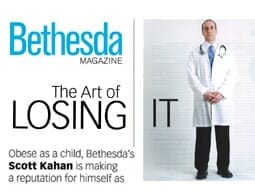By Scott Kahan, MD
Published in The Huffington Post
If you haven’t seen the New York Times article describing a new NIH study on long term outcomes of former Biggest Loser contestants, I strongly recommend reading it here. It showed that most contestants gained back weight and their metabolic rates plummeted.
Those who have read it seem to be universally upset. Countless patients told me it made them feel hopeless – “what’s the point of all this if my body is just going to undermine my efforts?” One patient was convinced that the author wrote it “just to make fat people feel like failures.”
I’m somewhat fascinated by the overwhelmingly negative and emotional reactions. My own view is actually quite positive. Here’s why:
Let me first start with this: Just this morning, a patient who has lost 180 lbs walked into my office with a printout of her metabolic rate report. She’d been beside herself after reading the article and rushed to get tested. Turns out her resting metabolic rate was perfect, actually slightly above the predicted rate for her size, despite her huge weight loss. Standard “results not typical” disclaimers apply, but I just had to get that off my chest.
Although the contestants regained weight after the show, the weight they kept off greatly exceeded my expectations. These folks were set up to fail miserably. They didn’t: they maintained 12% weight loss over six years. That’s on par with Lap Band surgery, which results in an average of 15.9% weight loss at 3 years (with some degree of weight gain thereafter). Their results were even more impressive, when you consider that the average American gains more than one pound a year, even more for persons with severe obesity. Given this background weight gain, it is conceivable that their weights are 20% lower today than where they would have been otherwise.
And they did it in the most unlikely of circumstances. They were sold the mother of all fad diets: Leave your life, job, family and friends to devote yourself to inhuman amounts of exercise and food restriction, as you compete to lose years’ worth of weight in a matter of weeks. (A former physician on the show even told me that many were given diuretics and other cocktails to squeeze out every possible ounce for the weekly weigh-ins). Then right when it’s going to get even harder (i.e., maintenance), with your metabolism in the dumps and hunger hormones raging, you’re on your own. The trainers, the cameras, the encouragement, the excitement, the external rewards go away. Go back where you started, to the same situation and stressors that propagated the obesity in the first place, without help or hype, treatment or follow-up, or any tangible plan or support. You’re on your own.
Why would we expect them to keep any of it off?!
Yet they did. They should be celebrated now far more than when they were losing all that weight on camera. It’s heartbreaking to think that they all feel like failures, when it couldn’t be further from the truth.
I especially love how the article ended, with Danny Cahill, who lost 239 lbs on the show and regained more than 100 lbs since, telling us that learning about the metabolic changes that accompany weight loss put his struggles in context, and helped the shame roll off his shoulders. This is what’s most meaningful to me about the article. I’m hopeful it will help destigmatize obesity, even a bit. Perhaps it will help healthcare professionals understand why their patients have such difficulty managing weight, and why admonishing them to “just eat less and exercise more” isn’t helpful. And help those who argue we should blame and shame people into losing weight think past their ignorant assumptions and beliefs.
Here are a few thoughts I hope you’ll take away from this:
- Obesity management is challenging, but not futile. Losing weight isn’t easy. But we don’t expect or shy away from hard work in other areas of our lives, and this is no different.The reality is that our biology responds to weight changes, sometimes powerfully. We’ve long known that metabolism declines during weight loss, but it’s not a fait accompli.The Biggest Loser contestants were extreme outliers, with some showing nearly a 1000-calories-per-day lower metabolism. No prior study has demonstrated anywhere near this degree of biologic adaptation. Some studies show virtually no decrease; others show a modest decline of perhaps a few dozen to a few hundred calories per day. Indeed, my patient, above, maintained normal metabolism despite losing more weight than most of the Biggest Losers.My friend Kevin Hall, the NIH researcher who led the Biggest Loser study, uses the analogy of a spring: the farther it’s stretched, the harder it pulls back. It’s conceivable that if the contestants had followed a less insane weight loss path, without having to play to the cameras and producers, they’d have disrupted their biology far less. The science is incomplete, but thus far supports this.
- Don’t just gut it out on your own. It can be upsetting to hear that our body is fighting against our best efforts, but knowledge is empowering and helps us figure out how to move forward.Every tenet of chronic disease management requires long-term support and treatment. It’s unrealistic to expect ongoing benefits without ongoing care. Studies show that simply having continued interaction and support improves long term weight loss. That’s why some programs, like Weight Watchers, build around regular meetings, indefinitely.In addition to external support, building sustainable energy is critical for long term weight management. It takes deliberate work to anchor this motivation in your deeply held values and preferences, but it is the underlying reason why it’s so easy for some people to stick to kosher diets for religious reasons or vegan diets for ethical reasons.Moreover, there are ways to counter the biological changes to support your hard work. Physical activity attenuates some of the metabolic changes that drive weight regain. Some types of bariatric surgery normalize the metabolic changes. (Contrary to popular belief, most types of bariatric surgery work by addressing physiology, not necessarily by just making your stomach smaller).Several obesity medications address weight loss-related hormonal changes. In one study, subjects who lost a bunch of weight with diet and exercise were randomized to either a medication or a placebo. More than 80% in the medication group maintained their weight loss, while less than 50% in the placebo group kept it off, and those in the medication group doubled their weight loss over the next year.
- Don’t listen to the noise. Bob Harper, the host of the Biggest Loser, now says we should all do “intermittent fasting.” Sandra Aamodt, a researcher-turned-author, says “diets don’t work” and instead just eat mindfully and meditate. Fat versus carbs, diet versus exercise, mental health versus physical health, the cacophony goes on and on. Some surgeons I know basically say everyone should get bariatric surgery, and some doctors say everyone should take a pill or drink diet shakes.These are hyperbole and half-truths, false dichotomies that create confusion. Each may work well for some, but the messages that there is a one-size-fits-all magic bullet out there lead most people to throw out the baby with the bathwater. Learn about them all, don’t fall into the traps, and find your own fit.
- You’re not likely going to lose all the weight you expect. And that’s ok. Ignore the miracle weight loss promises from programs, books, and infomercials. Studies show that people expect many times more weight loss than what is realistic, more even than what is reasonable with bariatric surgery. Many people lose lots of weight, like the patient above who has lost 180 lbs and counting. But most lose much less; the average is closer to 30 lbs.Still, moderate weight loss can make all the difference. As little as 3% weight loss improves blood sugar and triglycerides (a type of cholesterol). 5-10% weight loss improves most health outcomes, physical functioning, and quality of life. One study showed that losing just 7% of your body weight decreases the development of diabetes by nearly 60%, even if some of it is regained. Most people start feeling better as soon as they start making changes, even before any tangible weight loss shows up.If these modest weight loss expectations make you want to throw in the towel, then it’s your interpretation we need to address, even more than the weight. No matter how much weight you lose, it may not be enough to make you happy. Because it’s not just about weight. We need to feel good to feel good.Feeling comfortable in our own skin doesn’t just happen. It isn’t automatic or ingrained for most people – especially not for those who have lived life being told that something is wrong with them because they don’t fit an idealized standard. We need to build an approach to feeling good, even as we work on being healthy. We have to learn to love our bodies and ourselves, regardless of how much there is to love.









